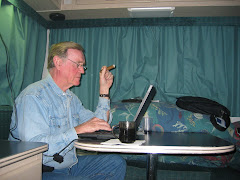

(Excerpted from my book Our Summer in Australia and New Zealand, Amazon.com)
A highlight of our time in Albany was a visit to the whaling station, which now goes by the unfortunate name of Whale World. The station was the last such large commercial operation to close under pressure from the worldwide bans and restrictive treaties on many form of whaling enacted in the 1970s. The Albany station closed in 1978 and is much like it was then, thereby being a good representative of what the industry was like.
For this modern operation, early in the morning a spotter plane would go to sea to determine if there were any pods, searching within 200 miles of the station. Once whales are located the whaling boats would be dispatched to the exact location. In some cases they would be out and back in the same day, a long one at that, but mostly it would take several days. Killed whales would be pumped with air to keep them afloat, and when sufficient numbers were harvested they would be towed to the whaling station, winched onto the land, flenced (a Norwegian word for stripping the whale), boiled, separated into product and prepared for shipping. Hard work, but mild in comparison to 19th century experience. Then, one spent two years at sea, the product stored below and available for looting by pirates and during war being seized for prize. The Albany station lasted so long because it was so efficient. Day laborers would only be called to work by a factory whistle when the returning boats had product to be rendered. If you are way down under this way it is a worthwhile stopping place.
The city of Albany adapted well to the declining whaling industry. Being surrounded by abundant forest resources authorities are preparing facilities for processing vast quantities of wood chips to feed paper mills in the Far East.. Further on along the coast Albany is installing ultra modern wind farms, which when completed, will supply 75% of the electricity for the city of 25,000. Another example that Australia is aptly named "The Lucky Country."
The picture shows the last whaling ship, quite well preserved and keeping with the Whale World image Elysee in 3d glasses used for viewing a film.
